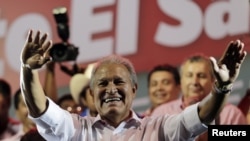Both candidates in El Salvador's presidential election have claimed victory. However, election officials say the race was "extremely tight" and neither candidate can yet be declared the winner.
The result is an unexpected twist to Sunday's vote. Polls leading up to the election indicated Salvador Sanchez Ceren, of the ruling Farabundo Marti National Liberation Front (FMLN), held a 10- to 18-point lead over San Salvador Mayor Norman Quijano of the right-wing National Republican Alliance, known as ARENA.
A victory by Ceren would make him the first former guerrilla commander to hold the presidency since a truce ended a devastating 13-year civil war in 1992.
Meanwhile, in Colombia, voters showed their support Sunday for peace talks with guerrillas by giving President Juan Manuel Santos a majority in Congress, while voters also elected his conservative rival, ex-president Alvaro Uribe, to the Senate.
The result consolidated President Santos as the front-runner in the presidential election on May 25, but thins the majority he will rely on if re-elected for legislative support to implement a peace deal with the Revolutionary Armed Forces of Colombia (FARC) rebels if talks succeed.
Uribe has been a fierce critic of President Santos' negotiations with the rebels. The former president's election to the Senate could complicate the talks with the rebels that opened in late 2012 in Havana, Cuba.
The FARC has been fighting for half a century against the Colombian government. It partly finances the insurgency through drug trafficking and frequent kidnappings of foreigners and Colombian officials.
The result is an unexpected twist to Sunday's vote. Polls leading up to the election indicated Salvador Sanchez Ceren, of the ruling Farabundo Marti National Liberation Front (FMLN), held a 10- to 18-point lead over San Salvador Mayor Norman Quijano of the right-wing National Republican Alliance, known as ARENA.
A victory by Ceren would make him the first former guerrilla commander to hold the presidency since a truce ended a devastating 13-year civil war in 1992.
Meanwhile, in Colombia, voters showed their support Sunday for peace talks with guerrillas by giving President Juan Manuel Santos a majority in Congress, while voters also elected his conservative rival, ex-president Alvaro Uribe, to the Senate.
The result consolidated President Santos as the front-runner in the presidential election on May 25, but thins the majority he will rely on if re-elected for legislative support to implement a peace deal with the Revolutionary Armed Forces of Colombia (FARC) rebels if talks succeed.
Uribe has been a fierce critic of President Santos' negotiations with the rebels. The former president's election to the Senate could complicate the talks with the rebels that opened in late 2012 in Havana, Cuba.
The FARC has been fighting for half a century against the Colombian government. It partly finances the insurgency through drug trafficking and frequent kidnappings of foreigners and Colombian officials.






